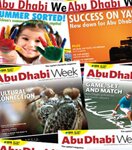 It’s almost that time of year again; the exact phases of the moon are being calculated and the capital is preparing for a month of after-dark eating and respect for the religious significance of this time. Here’s our beginner’s guide to Ramadan ...
It’s almost that time of year again; the exact phases of the moon are being calculated and the capital is preparing for a month of after-dark eating and respect for the religious significance of this time. Here’s our beginner’s guide to Ramadan ...
Ramada n is the ninth month of the Muslim calendar. The calendar follows the moon – the start and end of the month are determined by the sighting of the new moon – so Ramadan occurs about 11 days earlier each Gregorian year.
(This means that in 2010 and the year after Ramadan will be right in the middle of summer, and since drink is prohibited during daylight hours it could be that dehydration will hit hard.)
Ramadan is the month during which the Prophet Mohammad received the revelations brought to him through the Angel Gabriel. These revelations are considered to be the word of Allah and they form the Muslim holy book, the Qu’ran.
As a time to purify the soul, refocus attention on God, and practice selfsacrifice, Ramadan is much more than just not eating and drinking.
The word ‘Ramadan’ actually comes from the Arabic ‘ramida’ meaning ‘parched thirst’ or ‘sun-baked ground’. It is expressive of the hunger and thirst felt by those who spend the month in fasting. As opposed to other holidays, when people often indulge, Ramadan is by nature a time of sacrifice.
 Prayer
Prayer
Ramadan is regarded by Muslims as a time to offer more prayer than usual; Muslims ask forgiveness for past sins, pray for guidance and help in refraining from everyday evils.
Towards the end of Ramadan, many Muslims observe the Night of Power (Leyla al-Qadr). The Qur’an describes this night in a chapter named for it; tradition holds that it is the night during which that the first revelation of the Qur’an was sent down to the Prophet. It’s not a specific date, and Muslims are instructed to “seek” the Night of Power during the last ten days of Ramadan – particularly on the odd nights (the23rd, 25th and 27th).
The last nights of Ramadan are in any case those that many Muslims regard as the most important, retreating to the mosque to read the Qur’an, reciting special supplications (du’a), and reflecting on the meaning of Allah’s message. It is believed to be a time of intense spirituality, when the believers are surrounded by angels, the gates of heaven are open, and God’s blessings and mercy are abundant.
Fasting
For all Muslims Ramadan is a time for inner reflection, devotion to God, and self-control; some Muslims think of it as a kind of spiritual tune-up.
In particular, Ramadan is a month of fasting – and fasting is important: it is one of the five pillars of Islam (the others being faith, charity, prayer, and the Hajj, the pilgrimage to Mecca).
During the month of Ramadan, Muslims drink, and other physical needs during the daylight hours. The Arabic word for fasting (sawm) literally translates as ‘refraining’ – and it means not only eschewing food and drink, but also evil actions, thoughts, and words.
For Muslims, the most important point about fasting is that it is a means of learning self-control. So during the daylight hours of Ramadan there is a prohibition on food, drink, cigarettes and sexual relations, though medical conditions which require you to break your fast are allowed. (And no lies, slander, or greed; they all nullify the fast.)
If someone is ill or pregnant they do not have to fast, and neither do women who are menstruating. Women have to ‘make up’ the days of Ramadan they miss due to menstruation, by fasting extra days.
Although there are no set rules on the age at which Muslim children should start fasting, most will be doing so by the age of 12 and many start doing halfday fasts at a younger age so they can ‘practise’ and not feel left out.
Ramadan etiquette
The rule of thumb is that a Muslim can eat a pre-fast meal (‘suhoor’) before dawn but must stop at the dawn call to prayer. They would not eat anything else all day until after the evening prayer, at which point they will have a meal called ‘iftar’ – which is why many restaurants serve iftar buffets.
For non-Muslims, the UAE’s laws ban eating and drinking in public during Ramadan. In practice this is often interpreted as a prohibition on eating and drinking within the sight of Muslims, so many employers and hotels provide special rooms for those that are not fasting.
Some restaurants and many nightclubs will be closed during Ramadan; there is a theoretical ban on alcohol being served and music being played, though in practice it is possible for a non-Muslim to find both.
Faith and festivities
The Abu Dhabi National Exhibition Centre is getting ready for Ramadan this year with the return of the Ramadan and Eid Festival.
The popular event runs from 30th August until 24th September, showcasing the spirit of Ramadan with family-friendly events and traditional celebrations.
From 8pm until 3am each night, the Ramadan and Eid Festival 2009 will recreate the joyous atmosphere of the Holy Month with a consumer show and plenty of traditional activities.
A number of market stalls will sell everything from traditional carpets, perfumes, clothes, handmade
gifts, Arabic food, children’s toys and games and much more, while traditional song and dance will bring in the festivity and capture the spirit of Ramadan in the capital.
Alternative Ramadan
Ramadan is the usual form of the Arabic word, but you may also see Ramadhan, Ramdan, or Ramadaan; and it is sometimes spelled as Ramazan or Ramzan.
Digital Ramadan
Hunt around on the Internet and among the usual waste of electronic space you’ll find some beautiful digital calligraphy and images for Ramadan and Eid. The best of these are on www.deviantart.com – go there and search for ‘Ramadan’. And several great images are available as downloadable wallpapers. Trying Googling ‘Ramadan wallpaper’, or check out these personal favourites:
? www.tinyurl.com/klem6a
? www.tinyurl.com/kvnsmy
? www.tinyurl.com/nqkewa
[Caption] The month of Ramadan is associated with a number of symbolic decorations and artefacts – among which the lantern is one of the most popular. Its significance is beautifully clear: Ramadan is a time for spiritual illumination, At the end of the day it is traditional to break the fast as the Prophet used to, by eating dates and drinking water. This is not a mandatory part of Ramadan, but it is widely followed particularly by the more devout and traditional Muslim, The special significance of Ramadan lies in the fact that the Qur’an was first revealed to the Prophet Mohammed during the month. Many Muslims redouble their devotions during Ramadan, praying and reading the Qu’ran
[Originally published in Abu Dhabi Week vol 2 issue 28]





